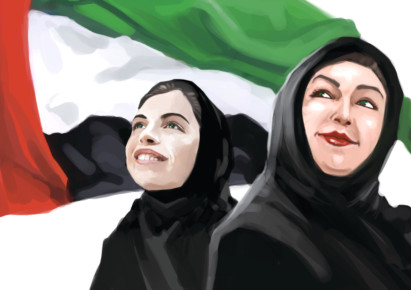
Vitamin C, check. Mosquito repellent, check. Cereal bars, check, solar charger, check. It was the night before my flight and I was checking off my list for all essentials I would need when my father walked in. By now, I am accustomed to his line of questioning:
“Is it safe?”
“Yes, father.”
“Are you with a team?”
“Yes, father.”
“Do you need anything?”
“I am ok, father.”
Despite my assurances, he nods, still worried, and hesitantly says: “A parent never stops worrying.”
My father’s stance on working women is a close representation of the UAE community’s view. A people so eager to provide all the necessary support to its women are still hesitant and cautious when it comes to their independence.
The evolution of women’s role in UAE society has been spurred by the leadership’s recognition of the pivotal role women can play in economic and social development. It is a testament to the government’s strategic vision to enhance their roles in both the public and private spheres and to ensure that all career options are open to them.
Despite the increasing participation of women in unconventional fields, it remains an anomaly and not the norm thanks to the social, cultural, intellectual and religious heritage of the UAE.
Much more remains to be done despite the UAE’s significant efforts towards diversifying the workforce. People, including women, are still uncomfortable with alien identifications that go beyond the roles and responsibilities shaped and mandated by society and religion. As such, while government support is principal in providing new opportunities to women, tackling existing cultural stereotypes and perceptions is key to overcoming these hurdles.
This argument — where women should and should not work — has been the subject of dispute between those who support women’s freedom to choose any career and those that believe women should be housewives or in domains with minimum exposure and male interaction.
Undoubtedly, I side with the former. I graduated with a degree in architecture, a field that was dominated by aspiring women. A year into practice, I realised that I yearned for something different. Seeking something more strenuous, I quit my job and pursued a Master’s in development planning — a course not offered in the UAE.
Working in the development and aid sector is not what most assume it to be. It does not leave you with a warm, fuzzy feeling at night. It’s challenging and demanding, both physically and mentally. My job requires me to travel to places considered unsafe for women.
To be on the field, sometimes in the scorching desert heat, where services — If any — are basic, is hard. We travel for hours in narrow valleys, where conditions are arduous and electricity and clean water are often in short supply.
You learn how to calmly brush off cockroaches and lizards from your bed and curtains and silently pray that you don’t suffer food poisoning.
Yet, we do it. The body and mind are resilient, able to adapt to what may have once been incomprehensible.
There are many examples of Emirati women challenging the norms and working alongside their male counterparts. They show great inner strength, passion, vigour, and aptitude.
Last week, Maryam Al Saffar, the first Emirati woman operator of Dubai Metro, said: “I was very pleased to have this opportunity to show my abilities in this new career.”
A few years ago, Kholoud Al Dhaheri made history when the President appointed her as the first woman judge. The appointment reflected the government’s keenness to involve women in the development drive and boost their role in society.
Our leadership has always been the driving force for women’s empowerment. His Highness Shaikh Mohammad Bin Rashid Al Maktoum, Vice-President and Prime Minister of the UAE and Ruler of Dubai, has said: “Arab women make up half our community. They are sometimes better than men. Today, they are rising to greater heights in our society and are able to achieve goals within our communities. They will only grow.”
The UAE continues to illustrate its commitment to advocating change and stronger roles for women while maintaining tradition and culture. If they get the support and opportunities, UAE women are capable of doing a lot despite the preconceptions and stereotypes. They must take up careers that challenge them as individuals, and more importantly set examples for others. Gone are the days when administrative roles and teaching was considered the proper job option for women.
As societal stereotypes continue to break down, UAE women have gone out of their way to prove themselves in fields that were traditionally known as male domains. They are embarking on unconventional paths. Yes, we already have women ministers, business owners, pilots, and parliamentarians.
It is time for new firsts.
Stories like Maryam and Kholoud should not be the anomaly, but the norm. More importantly, women should be given the freedom and trust to choose the careers they want. The common myths that some jobs are not suitable for women, or that women don’t have the physical or personal capabilities should not impede us.
My father has always been supportive; nurturing my ambitions instead of hindering them. The UAE woman deserves the same.
To calm his doubts and concerns I remind my father of our great founding father, Shaikh Zayed, who stated simply and decisively that “women have the right to work everywhere”.
Asma Malik is a development specialist. You can follow her on Twitter at www.twitter.com/AsmaIMalik









